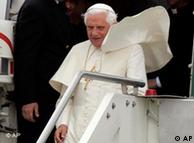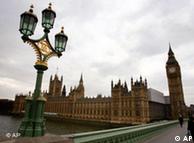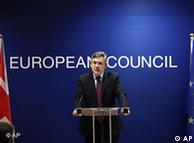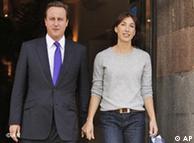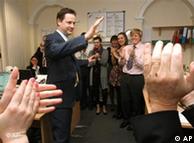In a U.K. election that has turned into a free-for-all, an unpersuaded voter and an unexpectedly open microphone threatened to change the plot.
In the former industrial town of Rochdale, British Prime Minister Gordon Brown was confronted Wednesday by a woman named Gillian Duffy about foreign workers coming into England, among other beefs. Moments later, thinking he was safely out of earshot, Mr. Brown was caught on microphone blasting his aides for exposing him to 'a bigoted woman.' The audio feed went out across the airwaves, the 'mortified' prime minister abjectly apologized, describing himself as 'a penitent sinner,' and the media went wild.
In a close election, it was the last thing the slumping leader of the Labour party needed. Normally, a blunder like that would enhance the chances of a resounding majority for Britain's other great party -- the Conservatives, led by telegenic 43-year-old David Cameron. After all, Labour and the Tories have traded places in a duopoly that has lasted nearly a century.
But this is no normal election. Mr. Cameron, considered a shoo-in two months ago and once commanding a lead north of 20 points, hasn't been able to close the deal, hobbled among other things by a failure to fully connect with the British public and an economic platform that hasn't clicked.
His Tories remain in the lead, but the limelight belongs to a third party, the Liberal Democrats. Their fresh-faced leader, Nick Clegg, also 43, upended the race in a televised debate April 15, persuading thousands of Britons that the two main parties can't fix the U.K.'s ailing economy and array of social ills.
On Thursday night, the party leaders will hold a third and final debate on the campaign's primary issue, Britain's struggling economy, setting the stage for a furious sprint to Election Day on May 6.
That debate is taking on even greater significance because for the first time in decades Britain faces a strong possibility of a 'hung Parliament,' in which no party wins a majority. So, while the immediate focus is on Mr. Brown's gaffe and its impact, a much bigger question is whether the days of the Labour-Tory lock on Parliament are numbered, and Britain is in for period of messier governance.
London voter Chris Squires, a sound engineer, says that like many Britons, he always thought a vote for a third party was wasted. 'When I realized the Lib Dems could change the two-party system, I thought it was worth voting for them,' he says.
In polls, the Tories hold a small lead over the Liberal Democrats and Labour. Some more recent polls suggest a hardening of the Tory lead in this fluid contest, and most analysts still put their money on the Conservatives carrying the day.
The outcome is hard to gauge because of Britain's electoral system. People don't vote directly for prime minister. That job normally goes to the leader of the party with the most Parliamentary seats. The Tories could conceivably win the most votes yet have fewer seats in Parliament because of the way district boundaries are drawn.
The Liberal Democrats almost certainly can't win enough seats to make Mr. Clegg prime minister, but he would be in a powerful position in a hung Parliament. If Labour has the most seats, Mr. Clegg could demand, for instance, that Mr. Brown step aside as party leader in exchange for support. Or the Liberal Democrats, who seek to revamp the electoral system, could demand revisions that would change British politics for years.
Mr. Clegg has shoehorned himself into the race in part because the two big parties left the impression the time is ripe for a good old-fashioned housecleaning.
While the country battled a long recession, politicians bogged down last year in a scandal over their abuse of Parliamentary expense accounts, a month-long drama that left voters viewing the establishment as corrupt and in need change. Though Liberal Democrat members had to explain their own dodgy claims, the party benefited by being seen as outside the political aristocracy.
Labour already faced a malaise far from the optimism brought by its 1997 victory under Tony Blair. His 'New Labour' succeeded in part by looking beyond the party's declining working-class base to middle-class voters, overcoming its reputation for high taxes and high spending. He handed the reins to Mr. Brown in 2007.
Today -- after recession, intra-party strife and unpopular wars in Iraq and Afghanistan -- the party's legacy is under attack. A decade of government largess also haunts the party, with public spending as a percentage of gross domestic product up to 48% this year from under 40% in 1997.
The effects are felt even in Labour strongholds like Knowlsey, north of Liverpool in northwest England, where Labour carried two-thirds of the vote in the last election five years ago. Billions of pounds in public spending over a decade brought benefits like a GBP 250 million hospital and seven new schools that cost GBP 370 million.
Many Labour politicians have despaired of Mr. Brown's ability to connect with the public, and what they call his bad-tempered nature. These downsides came into sharp focus on Wednesday at a campaign stop designed to show he could mingle confidently with voters. Instead, after Ms. Duffy confronted him on live TV, Mr. Brown was heard telling aides, 'That was a disaster -- they should never have put me with that woman,' and referring to her as 'a bigoted woman.'
After 13 years out of power, the musty Tories, called by some the 'nasty party' for a hard-nosed approach to public services and economics, seemed ready to take the reins this year.
The Tories' Mr. Cameron was raised in a classic Conservative Party milieu: the son of a stockbroker and an aristocratic mother, educated at Eton and Oxford. But he won the Tory leadership in 2005 after pitching himself as a modernizer who would 'switch on a whole new generation' and broaden the party's reach. Mr. Cameron spent years moving the party toward the center and embracing ideas like racial diversity and environmental protection. He reached out to gays and visited a Norwegian glacier to talk about climate change.
Mr. Cameron quickly overtook Labour in popularity. He gained momentum as the economic boom shepherded by Labour headed for bust, and looked set to finish off Mr. Brown.
Yet as the recession deepened, it was often Mr. Cameron, not Mr. Brown, who suffered. The economy took the focus off Mr. Cameron's narrative of a modern Conservative Party, and Mr. Cameron reverted to an old Tory message: To master its deficit, he says, Britain needs tough cuts in public spending and an 'age of austerity.' Mr. Brown replies that such cuts would drive the U.K. back into recession. And criticism of cuts resonates in a country where over half of employment is tied directly or indirectly to public spending.
Mr. Cameron's 'basic strategy was to allow an unpopular government to lose the election, and just to seem young and to give the 'change' message. But the recession came, the whole world changed, and they didn't move fast with it,' says Amanda Platell, who was press secretary to William Hague, the Tory leader who lost the 2001 election.
Mr. Cameron also suffered from the somewhat convoluted way he arrived at his economic message. Early on as party leader, he said he would match Labour's public-spending commitments for the first year. When the financial crisis hit, he criticized bailout policies that ultimately succeeded in averting a bank collapse. More recently, he irritated the right by appearing to soften his talk of spending cuts.
First, 'they didn't understand the scale of the economic shock, and without understanding they criticized the government and went with this austerity message, which they [then] backed off on,' says David Blanchflower, a former member of the Bank of England's monetary policy committee who's now at Dartmouth College in the U.S. 'The Conservatives have had a credibility problem on the economy,' says Mr. Blanchflower, who says he has no party affiliation.
Representatives for Mr. Cameron said that he was ahead of the curve on many aspects of the financial crisis, including the need to fight deficits, and that his policies have been backed by leading business people.
The major parties' weaknesses left the door ajar to the Liberal Democrats.
A previous incarnation, the Liberal Party, once was one of the U.K.'s two major parties, before it was usurped by Labour in a 1922 election. The Liberals allied with the Social Democratic Party in 1983 and merged with them in 1988, creating a party that briefly pushed Labour into third place in opinion polls. After a fallow period, the party began to pick up steam again in 1997 as it portrayed itself as a center-left alternative for those disillusioned with Labour.
Mr. Clegg, while positioning himself as the new face of politics, has spent most of his career as a politician. Like Mr. Cameron, he has an aristocratic heritage. He is the son of a banker and was educated at elite schools. But going into the campaign, Mr. Clegg was so little known that in one poll, some confused him with Nick Griffinof the far-right British National Party.
Everything changed 2 1/2 weeks ago after the U.K.'s first-ever televised campaign debate. Before going into the studio April 15, a nervous Mr. Clegg shook hands with his team.
Mr. Clegg returned to his hotel room afterward and he told his staff the debate could really 'galvanize things.' Even so, they were shocked as early editions of British newspapers were nearly uniform in the verdict that Mr. Clegg had gate-crashed the race. Suddenly it was a free-for-all, not a two-way race but one with a rising third party.
Mr. Cameron had to shift course, as Mr. Clegg had deftly swiped his role as Britain's change agent. The Conservatives replaced a television ad attacking Labour with one swiftly filmed in Mr. Cameron's backyard, in which the Conservative leader sought to regain control of his change mantra by promising to 'blow away the old way of doing things.'
The Tories, pushing the idea that voters could inadvertently reinstall Labour if they didn't support the front-running Conservatives, warned: 'Vote Clegg, get Brown.' Labour offered a variation on that warning: 'Flirt with Clegg, marry Cameron.'
Polls show support for the Liberal Democrats may be soft. Many voters are still waiting to make up their minds about Mr. Clegg. The last week of the campaign is shaping up as a vigorous push and pull.
Tuning in to April 15 debate, lifelong Tory Vicky Oakley, a 37-year-old auditor, hoped to see a youthful politician who had turned his party around with a message of change. She did, she says, but it was Mr. Clegg, to whom she had previously barely given a thought. Afterward, she texted a friend, saying, 'Clegg is getting my vote.'
After the second debate last Thursday, Ms. Oakley says Mr. Cameron made up ground. A fellow Tory texted afterward hoping to lure her back: 'Now wait for the final debate and Cameron's clincher.'
在
已經變成一場混戰的英國大選中﹐一位固執的選民和一個出人意料打開的麥克風有可能改變大選的劇情發展。
英國首相布朗在一個競選活動中背地裡將選民達菲稱作“頑固的女人”。出人意料的是,他忘了關上隨身攜帶的擴音器,這一抱怨被直播。
在 昔日的工業小鎮羅奇代爾(Rochdale)﹐英國現任首相布朗(Gordon Brown)週三不得不面對一個名叫達菲(Gillian Duffy)的女人的種種抱怨﹐其中包括進入英國的外籍工人問題。過了一會兒﹐就在布朗以為自己已經安全脫離了旁人的視聽範圍﹐人們卻在麥克風中意外聽到 布朗對助手大發雷霆﹐指責他們讓自己暴露在“一個頑固的女人”面前。他的話通過廣播和電視傳揚開來﹐“羞愧的”首相可憐地道了歉﹐自稱是“一個懺悔的罪 人”﹐媒體為此簡直瘋狂了。
在一場勢均力敵的選舉中﹐這是工黨聲望日益下滑的領袖布朗最不需要的。一般來講﹐像這樣的失誤會增大英國另外 一個主要黨派保守黨獲得議會多數席位的機會。保守黨的領袖是很上鏡的、現年43歲的卡梅隆(David Cameron)。畢竟﹐在近一個世紀的兩黨執政期間﹐工黨和保守黨輪流執政。

Reuters
保守黨的領袖卡梅隆週三前往位於英格蘭的一家可口可樂工廠。
不過這可不是普通的選舉。卡梅隆兩個月前還被視為是穩操勝券﹐並且曾一度領先20個百分點以上。現在他卻無法勝利結束戰鬥﹐受到各種問題的牽制﹐包括沒有完全與英國公眾打成一片和一個未獲成功的經濟平台。
他 所領導的保守黨仍處於領先地位﹐不過公眾關注的焦點卻在第三個黨派自由民主黨身上。該黨擁有年輕面孔的領袖克萊格(Nick Clegg)同樣也是43歲﹐他在4月15日的電視辯論中扭轉了競選的形勢﹐說服數千名英國人相信兩大主要黨派無法解決英國疲弱的經濟和一系列社會問題。
週四晚間﹐各黨派領袖將就競選的主要論題──英國陷入困境的經濟──進行第三輪也是最後一輪辯論﹐為5月6日大選日的激烈爭奪做好準備。
由 於這是英國數十年來首次極有可能面臨“懸浮議會”(hung Parliament)的局面﹐也就是沒有一個黨派贏得議會多數席位﹐這場辯論的意義甚至更加重大。因此﹐儘管目前的焦點是在布朗的失態及其影響上﹐一個 更大的問題卻是工黨和保守黨在議會中輪流坐莊的日子是否已經屈指可數了﹐英國是否將進入更混亂的治理時期。

Getty Images
自由民主黨領袖克萊格週三在牛津布魯克斯大學。
倫敦選民、音響工程師斯奎爾斯(Chris Squires)說﹐和很多英國人一樣﹐他一直認為把選票投給第三個黨派是種浪費。他說﹐當我意識到自由民主黨可能改變兩黨制度時﹐我想投他們的票是值得的。
在民意調查中﹐保守黨略微領先於自由民主黨和工黨。更近一些的民意調查顯示﹐保守黨在這場順利的競選中領先地位進一步鞏固﹐大部分分析人士仍認為保守黨將獲得大選的勝利。
鑒於英國的選舉制度﹐競選結果很難預料。人們並不是直接投票選舉首相。首相通常由在議會中佔最多席位的黨派的領袖來當。由於選區邊界的劃分方式﹐保守黨贏得的選票很可能會最多﹐不過在議會中的席位卻較少。
幾 乎可以肯定自由民主黨無法贏得足夠的席位來將克萊格推上首相之位﹐不過他會在“懸浮議會”中擔任重要職務。比如﹐如果工黨持有的議會席位最多﹐克萊格可能 會要求布朗不再擔任工黨領袖﹐以換取支持。抑或﹐尋求改革選舉制度的自由民主黨可能要求進行足以改變英國政治形勢多年的改革。
克萊格擠進競選﹐部分原因是英國兩大主要黨派給人留下了這樣的印象──進行一場徹底的老式大掃除的時機已經成熟了。
在英國與長期的經濟衰退作鬥爭之時﹐英國的政治人物卻在去年因濫用議會公帳報銷開支陷入醜聞。這場持續一個月的鬧劇留給選民的印象是﹐這個機構腐化墮落﹐急需變更了。儘管自由民主黨成員不得不對其閃爍其辭的聲明進行解釋﹐該黨派還是因未被視為政治貴族而受益。
與 1997年在布萊爾(Tony Blair)領導下贏得大選而帶來的樂觀情緒截然不同﹐工黨如今已經陷入了麻煩的境地。布萊爾領導的“新工黨”能夠獲勝﹐部分原因是由於超越了該黨數量不 斷下滑的工人階級選民而向中產階級選民尋求支持﹐克服了該黨派高稅賦、高開支主張帶來的不利影響。布萊爾於2007年將執政權傳給了現任首相布朗。
現如今﹐在經歷了經濟衰退﹐黨內傾軋及在伊拉克及阿富汗進行的不受歡迎的戰爭之後﹐工黨的聲望受到攻擊。執政10年期間採取的慷慨支出舉措帶來的問題也困擾著工黨﹐今年公共開支佔國內總產值的比重已由1997的不到40%上升到48%。
這 種影響甚至在工黨重鎮﹐如位於英格蘭西北利物浦北部的諾斯利(Knowlsey)也感覺得到。在五年前的那次選舉中﹐工黨在諾斯利獲得了三分之二的選票。 過去10年中數十億英鎊的公共開支帶來了福利﹐比如一家耗資2.5億英鎊的醫院﹐及七個總共花費3.7億英鎊的新學校。
工黨的許多政治人 物對布朗與公眾接觸的能力以及他們稱為布朗天生的壞脾氣感到絕望。這些缺點在週三得到鮮明的集中體現。週三在旨為展現布朗能自信地與選民打成一片的一個競 選活動點﹐在電視直播中人們看到在達菲女士向他當面質疑後﹐觀眾聽到布朗對助手說﹐“這是個災難﹐他們不應該將我與那個女人安排在一起”﹐並稱她是個“頑 固的女人”。
在喪失執政權13年後﹐因對公共服務及經濟採取頑固立場而被某些人稱為“骯臟黨派”(nasty party)的落伍的保守黨﹐今年似乎準備接管政權了。
保 守黨的領袖卡梅隆( Cameron)是在典型的保守黨環境中成長的。他的父親是個股票經紀人﹐母親出身於貴族﹐他在伊頓公學(Eton)及牛津大學(Oxford)接受教 育。但在他自我定位為一個現代化者﹐並標榜自己將開啟全新一代﹐並擴大該黨的影響力後﹐他於2005年獲選為保守黨領袖。多年來﹐卡梅隆推動保守黨向中心 靠攏﹐並積極接受種族差異及環保等理念。他主動接近同性戀者﹐還參觀過挪威的一座冰川以討論氣候變遷。
卡梅隆受歡迎的程度迅速超過了工黨。隨著工黨領導下的經濟從繁榮走向衰退﹐卡梅隆聲望大振﹐看來確定要取代布朗了。
但 隨著經濟衰退加深﹐遭受打擊的通常總是卡梅隆而非布朗。經濟衰退使關注的焦點從卡梅隆志在塑造一個現化化保守黨的豪言中轉移﹐卡梅隆重拾傳統保守黨人的論 調。他說﹐英國要控制赤字﹐則要大幅削減公共開支﹐並厲行節儉。布朗對此回應到﹐大幅削減公共開支會使英國重陷於衰退。在這個超過一半雇員直接或間接與公 共開支相關的國家﹐削減公共開支主張引起廣泛的批評。
2001年在大選中失利的前保守黨領袖黑格(William Hague)的新聞秘書普拉特爾(Amanda Platell)說﹐卡梅隆的基本策略是讓一個不受歡迎的政府在選舉中失敗﹐並只是要看起來年輕﹐還發出“改變”信號。但經濟衰退到來後﹐整個世界發生了 變化﹐他們無法快速推行這一策略。
對卡梅隆不利方面還在於他那令人有些費解的經濟主張。初任保守黨領袖之時﹐他說上台執政後的第一年會遵 守工黨做出公共開支承諾。但當金融危機爆發後﹐他對政府的救助策略進行指責﹐而該策略最終成功地避免了銀行崩潰。近來﹐他因削減公共開支立場似乎有所軟化 而激怒了右翼人士。
曾是英國央行(Bank of England)貨幣政策委員、現任職於美國達特茅斯學院(Dartmouth College)的布蘭奇弗勞爾(David Blanchflower)說﹐首先﹐他們沒有理解經濟震盪的嚴重程度﹐在不理解的情況下他們批評政府﹐並堅稱要緊縮財政﹐然後又讓步了。他說﹐保守黨在 經濟議題上出現了一個公信力問題。布蘭奇弗勞爾表示自己沒有黨派關聯。
卡梅隆的代表表示﹐在金融危機的很多方面他都具有前瞻性﹐比如提出要控制赤字﹐而他的政策已經得到了重要商界人士的支持。
大黨的弱點使得自由民主黨有隙可乘。
自 由民主黨的前身之一自由黨(Liberal Party)曾是英國兩個大黨之一﹐後來在1922年的一場選舉中被工黨超越。1983年﹐自由黨同社會民主黨(Social Democratic Party)結盟﹐1988年與其合併﹐合併後的政黨一度在民意調查中把工黨擠到了第三的位置。經過一段休眠期之後﹐從1997年開始﹐它把自己描述為對 工黨不滿的人們支持中偏左政黨的新選擇﹐於是重新在政壇上得勢。
克萊格雖然把自己定位成政壇新面孔﹐但他的大部分職業生涯都是從政。和卡 梅隆一樣﹐克萊格也有貴族頭銜。他出生於銀行家家庭﹐在貴族學校受過教育。但在選戰之前﹐克萊格名不見經傳﹐在一次民意調查中﹐甚至有一些人把他混淆成了 極右政黨英國國家黨(British National Party)的格里芬(Nick Griffin)。
兩個半星期以前﹐在英國開展歷史首次電視選舉辯論過後﹐一切都發生了改變。4月15日﹐在進入演播室之前﹐心情緊張的克萊格同他的團隊成員一一握手。
克萊格在辯論完後回到賓館房間﹐對他手下的人員說﹐這場辯論真的很能激發人的靈感。即便如此﹐當英國各大早報幾乎一致斷言克萊格已經入圍時﹐他們還是感到不可思議。突然之間﹐不再是兩黨“單挑”﹐而是一個崛起的第三方加入了角逐。
卡梅隆不得不轉變方向﹐因為克萊格已經巧妙地取代了他作為英國變革代言人的地位。保守黨撤下攻擊工黨的電視廣告﹐換成一個在在卡梅隆家後院倉促拍成的新廣告。這位保守黨領導人在其中承諾要“破除陳舊的行事方式”﹐企圖把變革口號重新歸於自己的名下。
保守黨警告說﹐“投票給克萊格﹐得到的將是布朗”。意思是說﹐選民如果不支持跑在最前面的保守黨﹐他們可能會無意中加強工黨的實力。工黨則把這句話變了一下說﹐“和克萊格調情﹐嫁的將是卡梅隆”。
調查顯示﹐民眾對自由民主黨的支持力度或許並不是很強﹐很多選民仍然沒有決定是否投票給克萊格。選戰的最後一個星期正在形成一次強力拉鋸戰。
4 月15日辯論進行時﹐37歲的審計師、一直是保守黨人的奧克利(Vicky Oakley)打開了電視。她希望看到一位年輕的政治家露面﹐以一種變革的信息實現自己政黨的翻身。奧克利說﹐她確實看到了這樣一位政治家﹐不過那是克萊 格﹐一個以前她基本沒有考慮過的人。過後她給友人發短信說﹐克萊格將獲得我的選票。
奧克利說﹐卡梅隆在經過上週四的第二輪辯論過後挽回了局面。後來一位保守黨朋友給她發短信﹐希望能拉她回來﹐短信說﹐現在就等最終辯論和卡梅隆的決定性發言吧。
Alistair MacDonald


